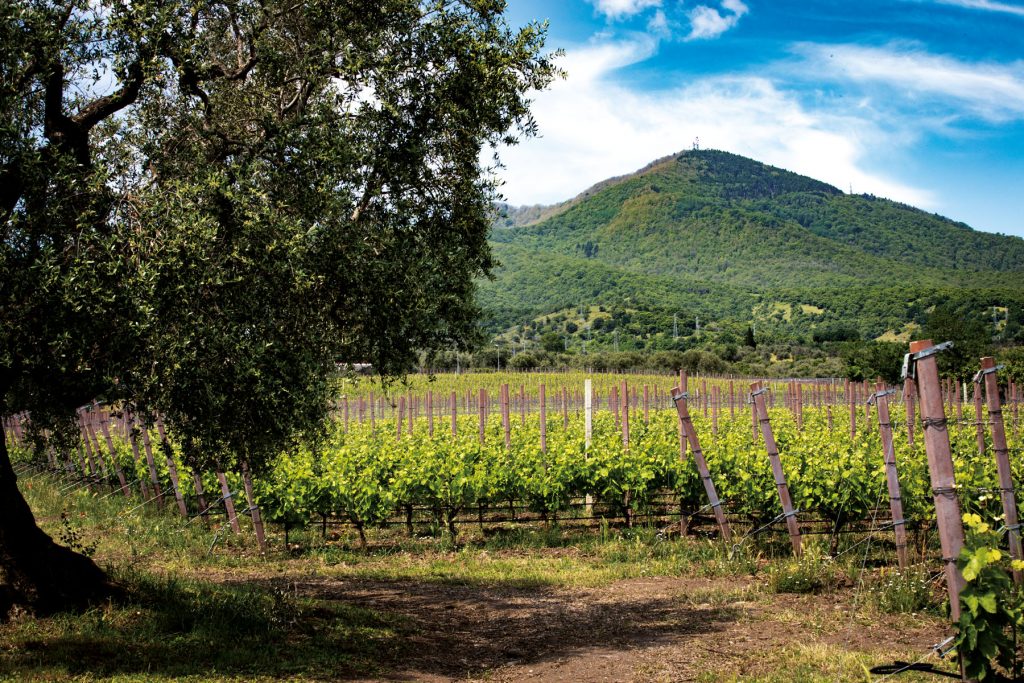 On our journey, leaving Potenza behind and going northward, after passing theDomusFedericiana of Castel Lagopesolewe arrive at the area of Vulture. Here you can find gentle and colourful hills covered mainly by vineyards and olive groves together with a blooming forest of beech trees, Turkish oaks and chestnut trees, where the green colour alternates with the blue of the lakes and waterways. This is the area of Vulture-Melfi, dominated by the presence of the Mount Vulture – a volcano extinct for about 140,000 years, but whose slopes are so fertile because of the long ago lava flows.
On our journey, leaving Potenza behind and going northward, after passing theDomusFedericiana of Castel Lagopesolewe arrive at the area of Vulture. Here you can find gentle and colourful hills covered mainly by vineyards and olive groves together with a blooming forest of beech trees, Turkish oaks and chestnut trees, where the green colour alternates with the blue of the lakes and waterways. This is the area of Vulture-Melfi, dominated by the presence of the Mount Vulture – a volcano extinct for about 140,000 years, but whose slopes are so fertile because of the long ago lava flows.
Its biggest crater stores one of the greatest treasures of Basilicata: the lakes of Monticchio. The dense vegetation around them makes these lakes a stunning naturalist view. Here you can find woods of chestnut trees, the fruit of which is delicious. One such example is the Marroncino of Melfi; a large, round and glossy brown chestnut.
The area of Vulture – a treasure chest of nature and art – preserves lots of other gems: Venosa (“the city of Orazio”), Barile, San Fele and its waterfalls, and a great many villages on the slopes of the “fiery and terrible volcano” as once defined by CesareMalpica. Vulture is deep, as is the taste of the wine produced here: Aglianico. It is among one of the most popular wines in Italy and has very ancient origins. In fact, even Orazio highlighted its qualities and Federico II also encouraged the plantation of this particular grape variety.
The DOC Aglianico of Vulture is the prince of wine varieties in Basilicata. Francesco, owner of one of the most top-rated wineries of the region, describes this wine as, “the blood which flows through the veins of this land.”
The Aglianico is a dark red, with shades of orange when it ages. It cannot be sold until it has been at least one year since harvest and it would be better to drink it after three years of ageing, when it becomes smooth yet maintains its minerality from the ground where its grapes grew.
The Aglianico of Vulture Superiore, instead, received the certification of DOCG because it has good structure and intensity along with a long lifespan. This wine is a perfect accompaniment to meat, wild game and ripe cheese.
This is also the land of the oil of Vulture, which received the first DOP certification in Basilicata in the olive growing sector. It is amber yellow with shades of green and it tastes of ripe olives. In fact, it may even be found to be sweet or slightly bitter and spicy. It is produced in the municipalities of Atella, Barile, Ginestra, Maschito, Melfi, Rapolla, Rionero in Vulture, Ripacandida and Venosa – all in the province of Potenza.The high quality of the oilis due to a localplant – the Ogliarola – whichmakes up 70% of plants in the olive groves.
 Gold here is also the colour of honey. In the Vulture area, Ripacandida is the city where the most honey is produced. It is one of the “Cities of honey” which in Italy work together to promote and protect the 60 kinds of honey produced in the country.
Gold here is also the colour of honey. In the Vulture area, Ripacandida is the city where the most honey is produced. It is one of the “Cities of honey” which in Italy work together to promote and protect the 60 kinds of honey produced in the country.
In Atella, a few kilometres from Ripacandida, milk is the local product which enriches the various goods of the Vulture area. Around the town there’s an important dairy chain, which is located onfertilesoil, rich in important minerals, nutrients and also pure water. The environment is also favourable for Frisona, a breed of cows bred for their milk.
A few kilometres from here, there isFiliano where the livestock industry produces another certified delight: the DOP Pecorino cheese of Filiano (further produced in another 29 townships in the area of Potenza). Its taste and shape are unique: it is sweet and delicate when freshly made, slightly spicy when it starts seasoning; it has a rind with shades from golden yellow to dark brown, showing marks of the typical baskets where the cheese has been left.
Vulture is also a spring of mineral waters. At the foot of the inactive volcano, sources have been flowing for ages. Waters are naturally sparkling and slightly acidic and they carry the memory, clearity and taste of its origins: they are unique like the land from which they flow.


